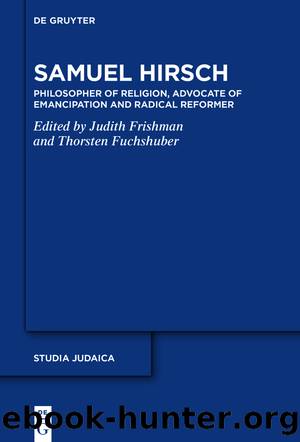Samuel Hirsch by Judith Frishman Thorsten Werner Fuchshuber

Author:Judith Frishman, Thorsten Werner Fuchshuber
Language: eng
Format: epub
Publisher: De Gruyter
Published: 2022-12-14T14:27:57.005000+00:00
The Messiah and Humanist Ethics
Hirsch then further argued that the alternative to his concept of the Messiah â the traditional, supernatural, miracle-working Messiah â contrasted strongly with the biblical religion. As the word of God, the Bible contains the only and eternal truth, but nowhere does it contain a reference to the Messiah âbringing new knowledge (Kunde) of heavenly things, new knowledge that we could never have anticipated, and that would never have reached us without himâ.39 Hirsch appears to be once again shifting the discussion away from the direction the debate about the repeal of Torah law in the messianic age would have traditionally taken. In fact, there are many references in post-biblical rabbinic literature to the Messiah bringing a ânew Torahâ with him, which would obviously contradict the earlier, biblical laws in some instances.40 Behind this expectation lies the Talmudic notion of the yoke of the biblical commandments,41 a yoke that will be set aside at the end of times in a messianic act of redemption. For upon his arrival, the Messiah will release the devout from the burdens of those limitations based on religious law that have been taken on willingly out of piety.42 Moses Mendelssohn, for whom the function of Jewish âceremonial lawâ was above all that of demarcation, could still imagine a miraculous second public revelation, a second prophet on the level of Moses who âwould introduce new religious practicesâ, that would make it possible for all peoples to worship their Creator together.43 This traditional idea was later appropriated by radical reformers, primarily Samuel Holdheim, who identified at least the beginning of the messianic era with the civic emancipation of the Jews and sought to use these Talmudic arguments to defend his abrogation of certain laws.44
As a classical Reform theologian however, Samuel Hirsch did not see Godâs commandments as a burdensome yoke, nor did he need Talmudic grounds to repeal outdated regulations. Hirschâs messianic theory is neither about the continued observance of the commandments in the kingdom of the Messiah, nor about legal principles, but about Herzensangelegenheiten (matters of the heart), a word that for him served as a metaphor for humanist ethics. In his sermon, Hirsch invoked the verse from Ezekiel (36:26) saying that âGod will take our heart of stone from our body and give us a heart of flesh insteadâ;45 but that would only be in Godâs own power because âthis work is not possible for his anointed one, for a human being the likes of us, nor is it relegated to himâ.46 Whether Hirsch is aware of the context of this position in the Christian-Jewish debate is impossible to determine here. The heart metaphor plays a decisive role in the Pauline critique of the Jewsâ âtechnicalâ observance of religious laws, which had been replaced by universal faith after the coming of Christ â while in rabbinical usage the image of âuncircumcisedâ or âstoneâ hearts referred exclusively to the struggle with âevil impulsesâ or more directly in Hirschâs terms, to humankindâs due repentance.
Download
This site does not store any files on its server. We only index and link to content provided by other sites. Please contact the content providers to delete copyright contents if any and email us, we'll remove relevant links or contents immediately.
Cecilia; Or, Memoirs of an Heiress — Volume 1 by Fanny Burney(32558)
The Great Music City by Andrea Baker(32019)
Cecilia; Or, Memoirs of an Heiress — Volume 2 by Fanny Burney(31956)
Cecilia; Or, Memoirs of an Heiress — Volume 3 by Fanny Burney(31942)
We're Going to Need More Wine by Gabrielle Union(19046)
All the Missing Girls by Megan Miranda(16028)
Pimp by Iceberg Slim(14507)
For the Love of Europe by Rick Steves(14121)
Bombshells: Glamour Girls of a Lifetime by Sullivan Steve(14075)
Talking to Strangers by Malcolm Gladwell(13370)
Norse Mythology by Gaiman Neil(13365)
Fifty Shades Freed by E L James(13241)
Mindhunter: Inside the FBI's Elite Serial Crime Unit by John E. Douglas & Mark Olshaker(9343)
Crazy Rich Asians by Kevin Kwan(9292)
The Lost Art of Listening by Michael P. Nichols(7506)
Enlightenment Now: The Case for Reason, Science, Humanism, and Progress by Steven Pinker(7313)
The Four Agreements by Don Miguel Ruiz(6765)
Bad Blood by John Carreyrou(6621)
Weapons of Math Destruction by Cathy O'Neil(6280)
